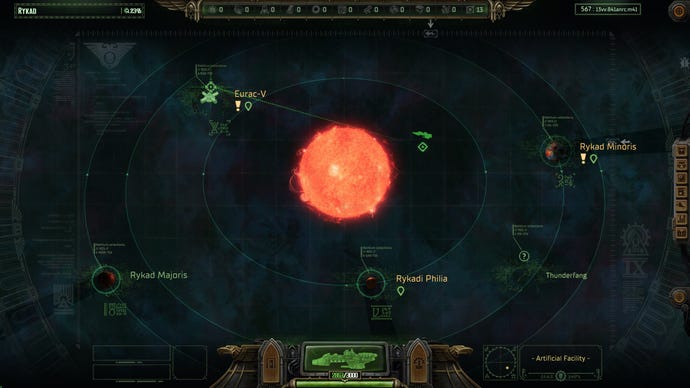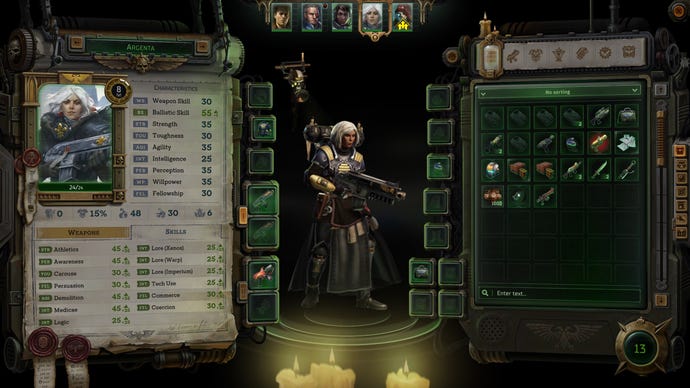Earlier this week I attended a hands-off preview for Owlcat’s forthcoming CRPG Warhammer 40,000: Rogue Trader, which is shaping up nicely, inasmuch as there’s anything “nice” about a Warhammer 40,000 game. Rogue Trader is a party-based affair in which you play a sort of Warhammer East India Company, tasked with flipping outlying worlds to the Imperium. In order to carry out this goal, you’re granted a lot more individual license than most human residents of the 40K universe. You can, for instance, recruit ungodly xenos to your grimdark troupe, operate a private armada, and even colonise planets and turn them into your own personal piggybank. Just watch you don’t push the whole “heresy” thing too far.
I’ll have more for you on the subject soonish, but here’s an interesting advance snippet from my interview with Owlcat’s creative director Alexander Mishulin, in which we discussed what really distinguishes a CRPG from other kinds of role-playing game. According to Mishulin, it’s all about designing for choices with consequences that genuinely run the entire length of the game, without (somehow) getting lost in the narrative undergrowth.
“In our opinion, the focus we put in our games is on crises, consequences and reactions,” Mishulin told me. “So when you make a decision, you should be able to see what it leads to, and you should be able to see your companions react to your particular decision, whether they like it or not. Sometimes the consequences should be rather harsh, or hard to deal with.” He gave the example of Space Marine and Inquisitor characters leaving your Rogue Trader party, and even becoming ferocious enemies, if you flirt a little too conspicuously with aliens and blasphemers.


“I’m not saying that all of your decisions have so much impact on your party and other characters – it would be rather difficult to play!” Mishulin added. “But there are some very important decisions you can make and face the consequences throughout the gameplay that go all the way to the epilogues.”
Having choices that take a while to play out naturally requires Owlcat’s CRPGs to be on the lengthy side: Rogue Trader is designed to last 100 hours or so. “That’s the reason why our game is so long, because we have to have space for this, if you’re making those kind of decisions,” Mishulin said. “Of course, there are some direct consequences, but it’s far more interesting when some of the consequences are delayed, and you face them further into the game, and you understand how it is all connected together. Of course it’s not the only reason – another is that we just like to have a lot of features and content, but yeah, we’re really interested in decisions, consequences and reactions.”
One question all this leaves me with is: what’s the most effective way to ensure that we can always trace the evolution and outcomes of choices we’ve made across 100 hours of play, particularly if we take a break? I’ve had to pause my Baldur’s Gate 3 playthrough, for instance, what with all the Starfield in the air right now, and with every day that passes, I’m aware that certain cause-and-effect chains are dissipating from my grey matter. At the very least, when I fire the game up again, I’ll have to reacquaint myself with the logic behind my character progression and equipment. Give it a week, and I’ll probably have forgotten who I’m supposed to be romancing, or why exactly Gale keeps eating my gloves.
RPGs do have various, well-established generic means of tracking or mapping the bespoke narrative you piece together in the course of playing them: from bog-standard conversation and quest logs, to more colourful lingering effects such as your good and bad deeds being writ large in a character’s appearance, a la Fable, or the player acquiring certain gear from particular decisions. I’m not sure any CRPG or other-RPG developer has ever nailed this, however, and the bulkier the game, the greater the stress I feel about keeping all my nested good/bad calls in view. Anyway, I’ll have more for you on Rogue Trader in the grim darkness of the far future (next week).
fbq('init', '700623604017080');
fbq('track', 'PageView'); window.facebookPixelsDone = true;
window.dispatchEvent(new Event('BrockmanFacebookPixelsEnabled')); }
window.addEventListener('BrockmanTargetingCookiesAllowed', appendFacebookPixels);
[ad_2]
